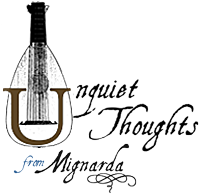Saturday morning quotes 4.16: Sage advice
This weekly series of quotes, now in its fourth year, often features and contexualizes bits from historical literature and music that emphasize the human need to maintain a link to creative arts. This is what defines our humanity. Today’s quote follows this theme, and our subtitle could very well read, “Why we bother.”
Our quote is drawn from an excellent article that touches upon the use and dissemination of music for lute and vihuela as a thriving emblem of humanism in the 16th century. Humanism, derived from the Latin and the concept of humanitas, is frequently equated with secularism, a mistake when placed in its 16th-century context. We prefer to think of humanism in its historical context as humanitarian benevolence, an apt amplification of most religious ideals.
The article is by Professor Jack Sage, specialist in music, poetry and drama of renaissance Spain. Sage’s work includes the English translation of an important 20th-century Spanish text by Surrealist, Juan Eduardo Cirlot Laporta (1916 – 1973), Cirlot, J.E. A Dictionary of Symbols. Trans. Jack Sage. London: Routledge and Kegan Paul Ltd., 1983. But we are most concerned with his work on the dedicatory texts of lute and vihuela books of the 16th century, including this extract from the print by Diego Pisador (c.1509 – 1557), Libro de música de Vihuela, Salamanca, 1552:
“…by printing his books, the composer fulfills his duty towards society setting out to profit all those desirous of learning music, without which man is seen to lack maturity and wit.”
Sage added this bit of context:
“Indeed, this may be construed as a statement, representative of the vihuelists and lutenists generally, of commitment to a belief in the artist’s duty to foster self-improvement in the individual for the common weal, a statement which seems to me to be at the heart of their ‘humanism’.”
– Jack Sage, “A new look at humanism in 16th-century lute and vihuela books,” Early Music, Volume XX, Number 4, November 1992, p. 636.
This is probably the best and most appropriate description of why we as Mignarda bother to preserve, perform and publish old music. Mignarda Editions is a series of publications of music that’s good for you, for the beguiling performance medium of of voice and lute and/or vihuela – or even guitar. The editions present unique and rare music that is selected, edited and arranged for maximum ease of performance. We make a pittance on these editions, but it does help us survive and keep up our exercise in humanitarian benevolence. And we like to think that’s good for everyone.
